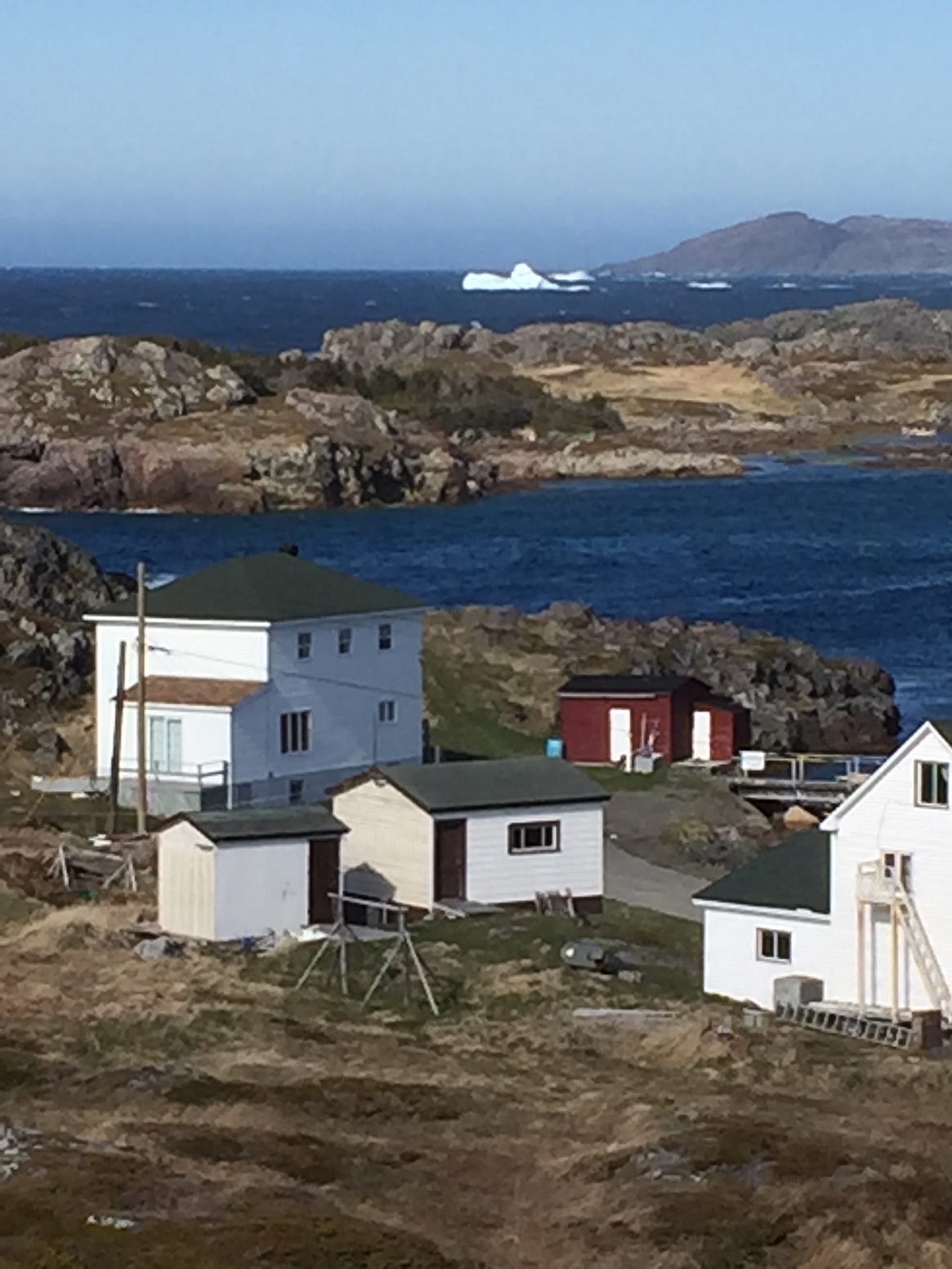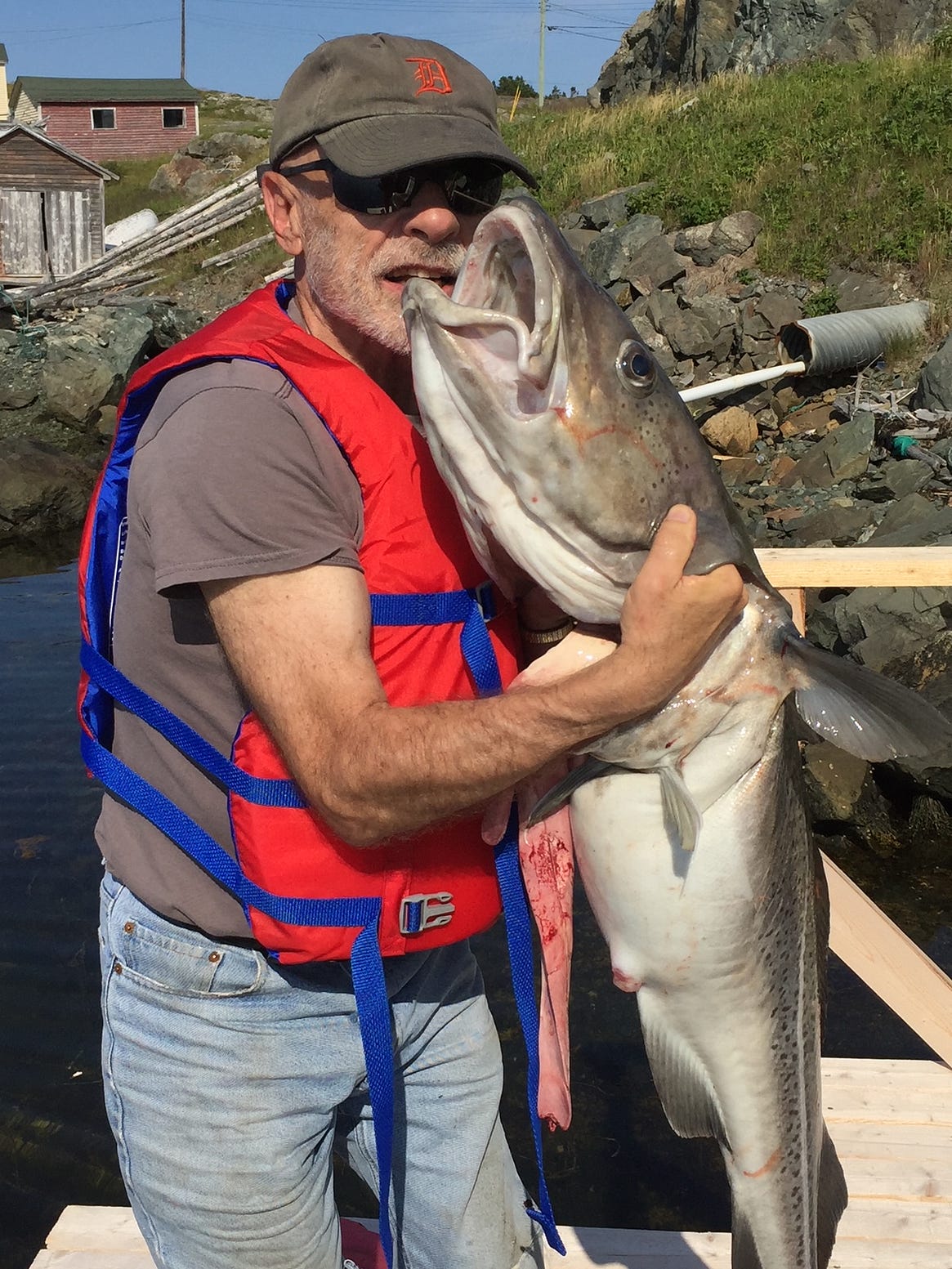This article was originally published in Ellemeno on Medium.com on 5/6/23

An old stone rolls on and sheds some if its moss
But every once in a while, you experience, maybe suffer through, an event that reawakens some latent, long fallow urge. It sets your under-exercised body rolling again and off you go, fragility and lethargy be damned.
That signaling event I’m alluding to often comes to pass from some fissure in your social fabric, let’s say a divorce or a death. Some kind of parting of your personal Red Sea that lays open your access to a far off shore.
In my own case, that event was the passing of my partner of 13 years. We both crossed over, him to some unknowable location and me to the far northeastern shore of Newfoundland.
There is a literal, not just metaphoric, expanse of sea to cross, the Cabot Strait, separating continental Nova Scotia from island Newfoundland. Absent Moses’s intercession (probably too cold for him), you do the crossing via a Canadian Marine Atlantic ferry. You and your car make a night crossing of about 8 to 10 hours, depending on how much chop is in the Strait. Or you can fly over, point-to-point in about 18 hours, and then rent a car. The flight time is so long because there are no direct flights between the U.S. and Newfoundland. You do a lot of puddle jumping.
The reason I chose Newfoundland at all, rather than any other spot on earth, harkened back to a European vacation in my early 20’s. I flew (cheap) Icelandic Airways at a time when they were only flying prop planes, necessitating a lot of puddle jumping. One refueling stop was at Gander, Newfoundland, at an international airport critical in supporting air traffic to and from Europe during World War II.
On the return from Europe, fall was well along in Newfoundland. The boreal forest was interspersed with yellow larch, red mountain maple, and rust colored tamarack, all surrounding or bordering an uncountable number of bays, lakes, and ponds. It was a stunning visual canvas that stayed alive in my memory even over the fifty years it took to get back and experience it close up.
Newfoundlanders are a welcoming bunch, maybe because geographically isolated people crave outside stimulation. They have a custom, called a “screech-in,” that endows an outsider with an honorary status as a Newfoundlander. It’s a fading custom now, used probably more as a marketing ploy to sell screech to those who don’t know better to avoid it. Screech is bottom-of-the-barrel spiced rum, akin more to turpentine than whiskey. One sip is all it takes to swear off it. It’s a more potent variant of Appalachian moonshine, or maybe not. We’d need a blind taste test to declare a winner.
The more important part of the screeching-in is kissing a cod. It shows a certain measure of respect for the history of Newfoundland’s settlement spurred by cod fishery, which, in spite of rough patches from overfishing, is still a staple of the economy. The third part involves an ugly stick, a makeshift adult sized rattle, which you have to proudly “play.”

You can see that there’s a bit of good humored humiliation involved in screeching, something of a backslap to Canadians in other provinces who make “Newfies” the object of a lot of down and dirty jokes. Sort of like hillbilly jokes you hear outsiders yuk-juking about in my stateside home in Appalachian West Virginia.
That friendliness and disarming ambience hooked me and I wanted to be a part of it, permanently. It nourished me. Manna for my grieving. After that first vacation visit — two weeks in the spring — I returned later that same year to spend another six weeks during the summer. That only whetted my appetite for more.
So back in the States over the fall and winter, I looked for a long-term rental for the following year. You’re allowed to stay in Canada six months in any one calendar year without a permanent resident permit. So six months it would be. The hoped for rental never materialized, but a house for sale did, and I took it.
I now owned a house on a small outport called Change Islands off the northeast coast of the main island. Locally this area is called Iceberg Alley because of the long string of icebergs calved off of Greenland that come floating south with the Labrador Current to meet their fate in warmer waters.
Change Islands and its neighboring big sister, Fogo Island, are accessible by a ferry departing, appropriately enough, from a spot called Farewell on the mainland. Farewell is bleak — no residents, no shops, and only a single building serving as the ferry terminal. It didn’t take much poetic vision to see it as a metaphor for a launch pad to a happier place. Which Change Islands was.
I don’t know if there’s an apt metaphor to characterize a person of a certain advanced age setting up a home in a community of about 120 permanent residents and a summer population, half that number, who the locals call “come from afars.” I would be one of those CFA’s for my first full season on island, but gradually insinuated myself into an intermediate status where people began to feel comfortable around me. It might have had something to do with energy and full dedication trying to comprehend a dialect of English akin to what was spoken some 200 or more years ago in southwest England. That’s where these people’s forbears originated. Another commonality with Appalachia.

By the end of my third season on the island, I was on friendly terms and a first name basis with the majority of the locals. In addition, I could with a reasonable level of accuracy tell who was related to who and how. Not a mean accomplishment.
Probably one of the big inducements to bring myself into the fold was the local population being, give-or-take, around my age. Change Islands is considered by the Canadian government to be an endangered community, able to exist at all because of subsidies the government provides for social, educational, and health services. At its peak in the early 20th century, it supported a population of more than 900 people, the great majority involved in cod fishing. Today, there are no fishermen likely under 35 and few under 50. The kids leave the island, just like they do in Appalachia.
I’ve dropped enough Appalachia references so far to leave little guesswork about why Change Island appealed to me. It reminded me of home in many ways and I fit in snugly and comfortably. The pride I have in being a West Virginian carried over easily to being a proud Newfoundlander. Now, though, the reality is that I’m a proud former Newfoundlander.
I did try to get a coveted permanent resident permit, with which I could stay year round and have immediate access to the province’s health care system. It’s hard to get that permit as a retired person though. An immigration lawyer I consulted said to find someone, a Canadian citizen, to marry. Make sure, though, that it’s a real love match, she said. As a gay man on an island of 120 people that’s a tough ask.
As luck would have it, though, my second season there the new teacher — the only teacher — at the school turned out to be gay! He was a young man of 32 or so and I proposed. He rightfully turned me down and there went my long shot. My only other possibility was to travel to St. John’s, the capital six hours drive away, and hang out. Something I was long out of practice doing.
I’d likely still be in Canada, spending my six months single and trying for that elusive hook up, if it weren’t for two things: COVID and a heart attack.
During COVID, Canada closed its borders, including to homeowners like myself from the States. That lasted for two seasons, but in the in-between time I had a heart attack. Without the residency permit, my health care besides becoming suddenly more precarious, would be expensive. Not to mention that there is no hospital or doctor on Change Islands. My insurance in the States wouldn’t work, though I’d still have to pay for it, and any medical attention I’d need would be paid out of pocket, not free as it is for Canadians.
So when the border reopened, I decided to stay just and only and forever a West Virginian. I deeded over the house in Change Islands to a local friend of mine, under the unlikely proviso that I could come back to visit anytime. As it is, we talk once in a while and I catch up with the changes to the people and the place. Some go, others come. The way it’s always been.
Postscript: That partner I was hunting for in Canada turned out to be someone who was here in West Virginia all along. Our stones rolled into one another and came to rest together.
Similar Posts:
- None Found